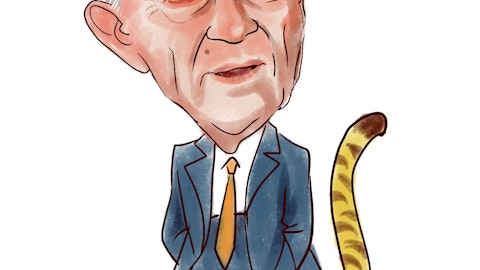2. Bank of America Corporation (NYSE:BAC)
Citadel Investment Group’s Stake Value: $341,886,000
Percentage of Citadel Investment Group’s 13F Portfolio: 0.07%
Number of Hedge Fund Holders: 72
Being among the most well known multinational American investment banks and financial services holding companies, Bank of America Corporation (NYSE:BAC) is considered one of the best financial stocks in Ken Griffin’s third quarter portfolio. The billionaire increased his stake in Bank of America Corporation (NYSE:BAC) by 23% in Q3, holding over 8 million shares worth $341.8 million.
Bank of America Corporation (NYSE:BAC) posted its Q3 results on October 14, reporting earnings per share of $0.85, beating estimates by $0.15. The $22.77 billion revenue was up 11.33% year-over-year, outperforming estimates by $1.16 billion.
On December 9, UBS analyst Erika Najarian assumed coverage of Bank of America Corporation (NYSE:BAC) with a Buy rating and a $64 price target. Bank of America Corporation (NYSE:BAC) is the analyst’s top pick among the U.S. large cap banks, and she said the stock is positioned to be a potential cyclical and secular winner in the coming cycle.
Out of the 867 hedge funds tracked by Insider Monkey as of Q3 2021, 72 hedge funds were long Bank of America Corporation (NYSE:BAC), down from 87 funds in the prior quarter. Berkshire Hathaway is the biggest Bank of America Corporation (NYSE:BAC) stakeholder from the third quarter, holding over 1 billion shares worth $42.8 billion.
Here is what Oakmark Funds has to say about Bank of America Corporation (NYSE:BAC) in its Q3 2021 investor letter:
“Earlier this year, one of our holdings, Bank of America, announced that it was raising its minimum hourly wage from $15 to $20 and would increase it to $25 by 2025. The company received great press for placing the well-being of its employees above profits. But was it really either/or? Bank of America’s chief human resources officer spoke to the bigger picture: “A core tenet of responsible growth is our commitment to being a great place to work…that includes providing strong pay and competitive benefits to help them and their families, so that we continue to attract and retain the best talent.” Bank of America understood that engaged, high-caliber employees are more productive, less prone to turnover and, therefore, less expensive in the long run. Increasing the pay for employees wasn’t elevating employees above shareholders; it was the right thing to do for employees and for shareholders.
If an increase to $20 was good, why stop there? Why not $50 per hour? Because the benefits the business receives at $50 don’t justify the expense. The bank would no longer be able to price its products competitively and would lose business. The employees would “win” in the short term, but eventually the lost business would lead to job cuts, meaning both employees and shareholders would lose. The negative effects of stakeholder overreach are no different than when CEOs overreach to inflate short-term profits. Both hurt shareholders and stakeholders.”





